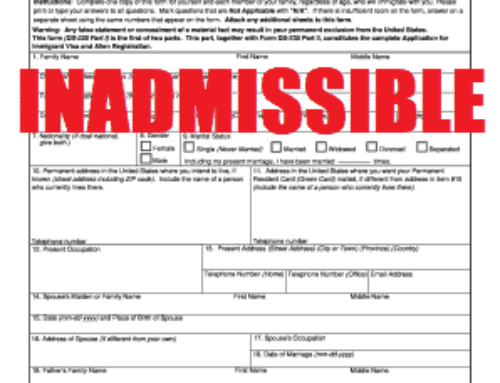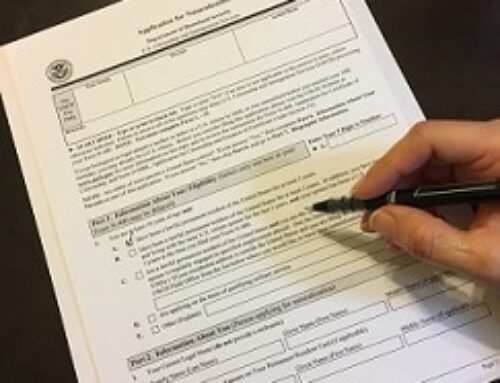 Asylum is a form of protection granted to individuals fleeing persecution or the fear of persecution in their country of origin or country of citizenship. While persecution can take many forms—such as race, religion, political opinion, social status, or nationality—some asylum seekers face persecution solely due to their nationality. This article will explore the complex process and challenges of seeking asylum based on nationality, including asylum eligibility criteria under immigration law, and the roles of immigration judges and government officials in asylum decisions.
Asylum is a form of protection granted to individuals fleeing persecution or the fear of persecution in their country of origin or country of citizenship. While persecution can take many forms—such as race, religion, political opinion, social status, or nationality—some asylum seekers face persecution solely due to their nationality. This article will explore the complex process and challenges of seeking asylum based on nationality, including asylum eligibility criteria under immigration law, and the roles of immigration judges and government officials in asylum decisions.
An asylum application may be considered, even under restrictive conditions, if the applicant can demonstrate changed circumstances that materially affect their eligibility for asylum, or if there are exceptional circumstances related to delays in filing the application. It’s crucial to seek legal advice to navigate these complexities and avoid a mandatory denial or a frivolous application.
What is Asylum Based on Nationality?
Asylum based on nationality refers to seeking protection in another country due to persecution faced solely because of one’s national origin. Such persecution can stem from racial discrimination, ethnic persecution, domestic violence, economic harm, or government policies that target specific groups. Many individuals apply for asylum by submitting Form I-589, Application for Asylum, with the help of an experienced immigration attorney, especially in cases where the fear of persecution based on nationality or race-based asylum is central.
The Process of Seeking Asylum Based on Nationality
Seeking asylum based on nationality is a complex process that frequently intersects with political beliefs, faith, ethnicity, cultural history, and other factors. Various elements, such as the country conditions, refugee status, and basis for asylum, play crucial roles in how asylum officers and immigration judges evaluate cases. The process includes several key steps:
Step 1: Arrival in the Host Country
The first step involves arriving in the host country, either by crossing a border, applying for a visa, or seeking refuge at an embassy. Upon arrival, individuals may be subject to an expedited removal process. During this process, they may express a credible fear of persecution to a government official, which could grant them asylum access and prevent immediate removal.
Step 2: Filing an Asylum Claim
After arrival, the individual must file a claim for asylum with the appropriate asylum office or government agency. This can be done through the affirmative asylum process for Affirmative asylum applicants or the defensive asylum process if the individual is already in removal proceedings. The claim must demonstrate a well-founded fear of persecution based on nationality, showing that there is a reasonable possibility of suffering persecution. Legal advice from a qualified attorney is essential to prepare the claim properly and avoid pitfalls like frivolous applications, which can lead to mandatory denial.
Step 3: Asylum Interview and Investigation
Once the asylum claim is filed, the applicant will attend an asylum interview with an asylum officer or immigration judge. During person interviews, the applicant must present evidence supporting their claim, including any documentation of human rights violations, domestic violence, or other forms of persecution they have faced. The asylum officer will assess the credibility of the applicant’s fear and the reasonable grounds for believing that the applicant’s country of citizenship cannot provide protection.
Step 4: Security Check and Investigation
Before a grant of asylum can be issued, applicants must undergo a security check. Government officials will investigate to ensure that the applicant does not pose a threat to national security and that there are no additional limitations or bars to asylum eligibility, such as involvement in criminal activities or certain forms of trafficking.
Step 5: Decision
After the investigation, the government will make an administrative decision on whether to grant asylum. Immigration judges play a crucial role in defensive asylum processes, especially when an applicant is in removal proceedings. If asylum is approved, the applicant may receive refugee protection, including the right to work, access to Social Security, and eligibility to apply for permanent residence (a green card) after one year. If denied, the applicant may face denial of withholding of removal and may need to consider internal relocation or other forms of relief.
Challenges of Seeking Asylum Based on Nationality
The process of seeking protection from persecution based on nationality presents several challenges:
1. Proving Credible Fear and Risk of Persecution
Applicants must provide substantial evidence to demonstrate a credible fear and risk of persecution in their country of origin. This includes documenting human rights violations, instances of domestic violence, or economic harm they have suffered. Without sufficient evidence, asylum officers or immigration judges may exercise discretion to deny the application.
2. Navigating Legal Complexities
The asylum process involves both affirmative and defensive processes, each with its own procedures and requirements. Legal advice is crucial to navigate these complexities, especially when dealing with expedited removal processes or when facing a mandatory denial due to missed deadlines or frivolous applications.
3. Dealing with Additional Limitations and Exceptional Circumstances
Applicants may face additional limitations if they have certain criminal convictions or if they have been involved in a form of trafficking. Exceptional circumstances, such as delays due to serious illness, may affect the timing and outcome of the application.
4. The Exercise of Discretion by Government Officials
Even if all legal requirements are met, government officials and immigration judges have the authority to exercise discretion in granting or denying asylum. A favorable exercise of discretion is not guaranteed and often depends on the specifics of each case.
Navigating Asylum Claims with Expert Legal Assistance
Seeking asylum based on national origin or ethnic persecution can be a daunting process, but it is crucial for individuals facing persecution to understand the legal avenues available. By familiarizing themselves with the essentials of asylum law, applicants can better navigate the asylum procedure and make use of defenses like withholding of removal in Immigration Court.
Consulting an experienced attorney from The Echavarria Law Firm is an essential first step in ensuring that your asylum claim is well-prepared. Elizabeth Francine Echavarria and her team have years of experience in immigration law and asylum claims, ensuring that your case receives the attention it deserves. For assistance in filing your asylum application, contact 210-320-5633 to receive the legal support you need.
About Elizabeth Francine Echavarria
Elizabeth Francine Echavarria was born and raised on the Texas-Mexico border in Del Rio, Texas. She graduated from Del Rio High School in 1996 and completed her undergraduate studies at the University of Texas at Austin with a Bachelor’s Degree in Journalism in 1999. After working in the financial industry with Charles Schwab, she pursued her law degree at St. Mary’s University in San Antonio, Texas.
During law school, she worked with Texas Rio Grande Legal Aid and the Bexar County Battered Women’s Shelter, gaining valuable experience with domestic violence cases and humanitarian asylum issues. Elizabeth graduated with a Juris Doctorate in May 2007 and was licensed to practice law in November of the same year.
Elizabeth began her legal career as a prosecutor for the Bexar County District Attorney’s Office in 2008, focusing on cases that often involved human rights violations and immigration status issues. Since 2010, she has dedicated her practice to immigration law, primarily in the areas of legalization, citizenship, and work visas. She is actively involved in pro-bono events to assist lawful permanent residents in becoming U.S. citizens.
As a member of the American Immigration Lawyers Association and licensed to practice in the United States District Court of the Western District of Texas, Elizabeth has been a guest presenter for various organizations, including the Bexar County Paralegal’s Association and Boerne Bar Association, providing information on current issues and changes to immigration law in the United States. Elizabeth is a compassionate and dedicated attorney who loves her work helping the immigrant community and their families. She speaks fluent Spanish, which enhances her ability to serve a diverse clientele.
Conclusion
Seeking asylum based on nationality involves navigating a complex legal landscape that includes affirmative and defensive asylum processes, understanding asylum eligibility criteria, and overcoming challenges such as proving credible fear and risk of persecution. With the potential for economic harm, domestic violence, and human rights violations in their country of origin, asylum seekers must present compelling cases to immigration judges and government officials.
Legal advice from experienced attorneys like Elizabeth Francine Echavarria is invaluable in this process. From preparing for asylum interviews to addressing exceptional circumstances and potential additional limitations, expert guidance can make a significant difference in the outcome of an asylum application.
If you or someone you know is seeking asylum due to persecution based on nationality, contact The Echavarria Law Firm at 210-320-5633 for professional assistance and support in navigating this challenging journey.
San Antonio Immigration Law Firm
Elizabeth Francine Echavarria was born and raised on the Texas-Mexico border in Del Rio, Texas. She graduated from Del Rio High School in 1996. She completed her undergraduate career at the University of Texas at Austin and graduated in December 1999 with a Bachelor’s Degree in Journalism. After working for four years in the financial industry with Charles Schwab, she decided to pursue her law degree and enrolled in law school at St. Mary’s University in San Antonio, Texas. During her time in law school, she worked with Texas Rio Grande Legal Aid and the Bexar County Battered Women’s Shelter. Elizabeth graduated from St. Mary’s Law School in May 2007 with a Juris Doctorate and was licensed to practice in November that same year.
Elizabeth began her legal career as a prosecutor for the Bexar County District Attorney’s Office in 2008, where she worked until 2010. Since then, she has focused her practice on immigration law, primarily in the areas of legalization, citizenship, and work visas. During her career she has also been involved in pro-bono events to encourage and assist lawful permanent residents to become U.S. citizens. She is a member of the American Immigration Lawyers Association and licensed to practice in the United States District Court of the Western District of Texas. She has been a guest presenter for various events, including the Bexar County Paralegal’s Association and Boerne Bar Association to provide information on current issues and changes to immigration law in the United States. Elizabeth is a compassionate and dedicated attorney who loves her work helping the immigrant community and their families. See Profile Here
Also Elizabeth Francine Echavarria speaks fluent spanish




